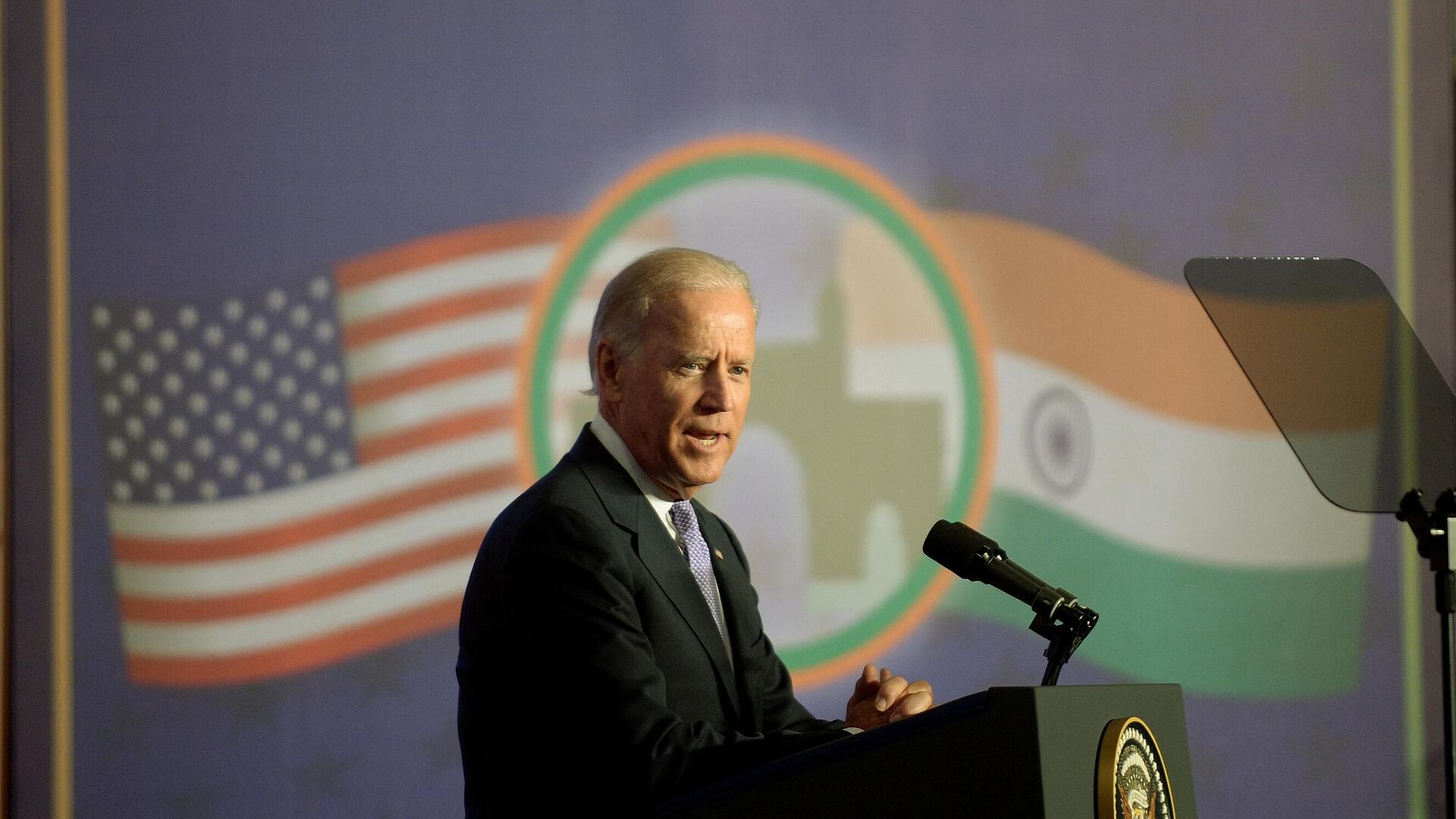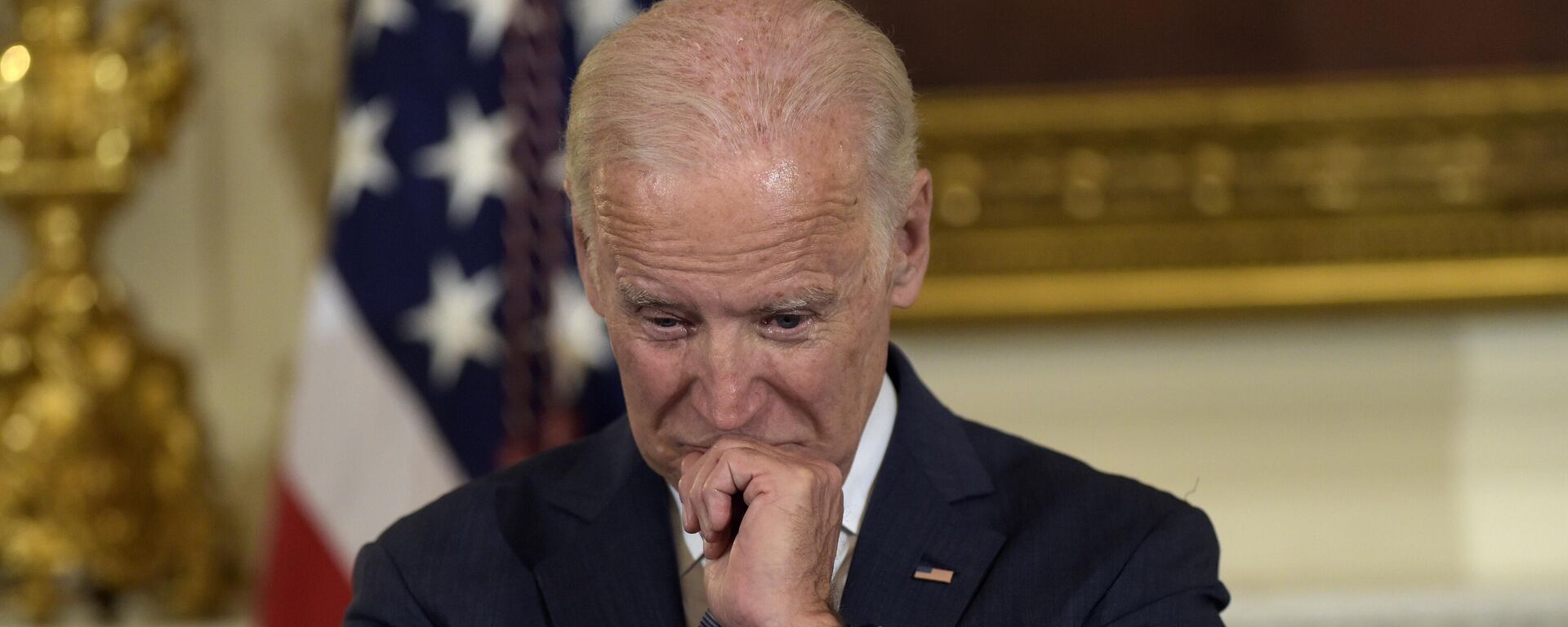https://sputniknews.in/20240411/diversion-tactics-deciphering-us-criticism-of-indias-human-rights-7099476.html
Diversion Tactics: Deciphering US Criticism of India's Human Rights
Diversion Tactics: Deciphering US Criticism of India's Human Rights
Sputnik India
The Biden administration has made inquiries into various issues in India, ranging from the arrest of Delhi's chief minister to concerns over the Citizenship... 11.04.2024, Sputnik India
2024-04-11T12:25+0530
2024-04-11T12:25+0530
2024-04-11T12:25+0530
joe biden
donald trump
india
pakistan
us
indian ocean
government of india
ministry of external affairs (mea)
ministry of defence (mod)
iraq
https://cdn1.img.sputniknews.in/img/07e8/03/14/6894860_0:554:2656:2048_1920x0_80_0_0_c0c44a047d95025bab949f243dfc521a.jpg
The Biden administration's criticism of India has sparked intense debate and prompted reflection on democracy and human rights.The US has raised questions about several issues in India, ranging from the arrest of the Delhi chief minister to concerns about the Citizenship Amendment Act (CAA), which bears a striking resemblance to the US's own Lautenberg Amendment of 1990.There are also allegations that the Modi government is targeting journalists, NGOs and government critics and using state institutions to silence political opponents. Moreover, there are allegations that Indian intelligence agencies have been involved in extrajudicial killings.US Criticism of India: Exploring Strategic Motivations & Geopolitical Realities"The allegations made against India are deemed baseless. Furthermore, the US is accused of double standards, as it overlooks similar issues in Pakistan while emphasizing them in India,” he added.According to Asthana, this double standard is driven by strategic considerations, "such as the perceived need for Pakistan's cooperation in managing tensions in Iran and combating terrorist organisations such as al-Qaeda or ISIS".“The US criticism directed towards India may be influenced by several geopolitical factors, including India's hesitancy to condemn the conflict in Ukraine and its continuous importation of Russian oil for re-export” said Dr Ash Narain Roy, Director of the Institute of Social Sciences.Roy pointed out that "the Democratic Party is at risk of losing significant support from American Muslim voters in the upcoming 2024 presidential election".Exit polls conducted in 2016 showed that 69 per cent of American Muslims voted for Biden, while 17 per cent supported Trump.Nevertheless, Roy stressed that America's dependence on India remains because of its strategic importance as a counterweight to China's influence.Double StandardsIn contrast, he stated that India refrains from extrajudicial killings or covert operations against terrorists, opting instead for open and transparent actions such as the surgical strikes against terrorist camps in Pakistan."India sees itself as a confident and responsible democracy, capable of openly addressing terrorist threats without resorting to tactics that compromise its principles,” Asthana assured.“In international relations, there are ‘no friends or foe’, but rather ‘permanent interests’. Countries forge relationships based on their current interests, leading to a landscape dominated by issue-oriented partnerships. Thus, India perceives the US not as an ally, but rather as a strategic partner, with their collaboration serving specific purposes or goals,” the General concluded.
https://sputniknews.in/20240404/uss-biased-position-against-india-ahead-of-lok-sabha-election-exposed-at-briefing-7032093.html
india
pakistan
us
indian ocean
iraq
afghanistan
palestine
russia
Sputnik India
feedback.hindi@sputniknews.com
+74956456601
MIA „Rossiya Segodnya“
2024
Swapna Nair
https://cdn1.img.sputniknews.in/img/07e7/09/12/4320104_0:0:681:681_100x100_80_0_0_ca8a7d4d582609272840ffdd1cde7278.jpg
Swapna Nair
https://cdn1.img.sputniknews.in/img/07e7/09/12/4320104_0:0:681:681_100x100_80_0_0_ca8a7d4d582609272840ffdd1cde7278.jpg
News
en_IN
Sputnik India
feedback.hindi@sputniknews.com
+74956456601
MIA „Rossiya Segodnya“
Sputnik India
feedback.hindi@sputniknews.com
+74956456601
MIA „Rossiya Segodnya“
Swapna Nair
https://cdn1.img.sputniknews.in/img/07e7/09/12/4320104_0:0:681:681_100x100_80_0_0_ca8a7d4d582609272840ffdd1cde7278.jpg
biden administration, democracy, human rights, us, india, delhi chief minister, citizenship amendment act (caa), lautenberg amendment of 1990, journalists, ngos, and government critics, indian intelligence, extrajudicial killings, united states, "moral policing of the world, major general (dr) sb asthana, global strategic & military analyst, double standard, al qaeda or isis, india, ukraine, russian oil, ash narain roy, director of the institute of social sciences, india, moscow, american muslim voters, trump, american muslims, arabs, biden, gaza, palestine cause, iraq, afghanistan, and libya, united nations security council, terrorists , syria or iraq, terrorists, surgical strikes, terrorist camps, pakistan, interference, espionage, bullying, and destabilization efforts, superpower, strategic partner
biden administration, democracy, human rights, us, india, delhi chief minister, citizenship amendment act (caa), lautenberg amendment of 1990, journalists, ngos, and government critics, indian intelligence, extrajudicial killings, united states, "moral policing of the world, major general (dr) sb asthana, global strategic & military analyst, double standard, al qaeda or isis, india, ukraine, russian oil, ash narain roy, director of the institute of social sciences, india, moscow, american muslim voters, trump, american muslims, arabs, biden, gaza, palestine cause, iraq, afghanistan, and libya, united nations security council, terrorists , syria or iraq, terrorists, surgical strikes, terrorist camps, pakistan, interference, espionage, bullying, and destabilization efforts, superpower, strategic partner
Diversion Tactics: Deciphering US Criticism of India's Human Rights
The Biden administration has made inquiries into various issues in India, ranging from the arrest of Delhi's chief minister to concerns over the Citizenship Amendment Act (CAA). Sputnik India examines the motives behind the US' propensity to criticise India.
The Biden administration's criticism of India has sparked intense debate and prompted reflection on democracy and human rights.
The US has raised questions about several issues in India, ranging from the arrest of the Delhi chief minister to concerns about the Citizenship Amendment Act (CAA), which bears a striking resemblance to the US's own Lautenberg Amendment of 1990.
There are also allegations that the Modi government is targeting journalists, NGOs and government critics and using state institutions to silence political opponents. Moreover, there are allegations that Indian intelligence agencies have been involved in extrajudicial killings.
US Criticism of India: Exploring Strategic Motivations & Geopolitical Realities
“The statement highlights the tendency of the US, particularly the Democrats, to engage in what is referred to as "moral policing of the world," a practice that has often backfired. Criticism of India is seen as part of this approach," Major General (Dr) SB Asthana, Global Strategic & Military Analyst told Sputnik India.
"The allegations made against India are deemed baseless. Furthermore, the US is accused of double standards, as it overlooks similar issues in Pakistan while emphasizing them in India,” he added.
According to Asthana, this double standard is driven by strategic considerations, "such as the perceived need for Pakistan's cooperation in managing tensions in Iran and combating terrorist organisations such as al-Qaeda or ISIS".
“The US criticism directed towards
India may be influenced by several geopolitical factors, including India's hesitancy to condemn the conflict in Ukraine and its continuous importation of Russian oil for re-export” said
Dr Ash Narain Roy, Director of the Institute of Social Sciences.
Another factor contributing to this criticism, according to Roy, "could be the aim of undermining India and exerting pressure, given India's close ties with Moscow".
Roy pointed out that "the Democratic Party is at risk of losing significant support from American Muslim voters in the upcoming 2024 presidential election".
Exit polls conducted in 2016 showed that 69 per cent of American Muslims voted for Biden, while 17 per cent supported Trump.
"The discontent among American Muslims and Arabs towards Biden is apparent, particularly concerning the administration's stance on Gaza. Moreover, the Democrats' critical portrayal of India could serve as a tactical manoeuvre to secure additional votes, especially amidst criticisms regarding their actions in handling the Palestine cause," Roy noted.
Nevertheless, Roy stressed that America's dependence on India remains because of its strategic importance as a counterweight to China's influence.
“The US is seen as lacking credibility in preaching to others, especially considering its own military actions, such as those in Iraq, which lacked justification as no weapons of mass destruction were found. These operations in Iraq, Afghanistan, and Libya were conducted without the approval of the United Nations Security Council, disregarding the sovereignty of the affected nations and undermining their security interests,” Asthana highlighted.
In contrast, he stated that India refrains from extrajudicial killings or covert operations against terrorists, opting instead for open and transparent actions such as the surgical strikes against terrorist camps in Pakistan.
"India sees itself as a confident and responsible democracy, capable of openly addressing terrorist threats without resorting to tactics that compromise its principles,” Asthana assured.
The primary justification appears to be that “as major powers, they (US) claim their actions serve the broader global interests, although this justification is frequently contradicted by their actual behaviour. How can the US justify actions such as interference, espionage, bullying, and destabilization efforts? These actions seem to originate from a mentality of being a superpower, where they feel entitled to set agendas and exert control over others,” Roy said.
“In international relations, there are ‘no friends or foe’, but rather ‘
permanent interests’. Countries forge relationships based on their current interests, leading to a landscape dominated by issue-oriented partnerships. Thus,
India perceives the US not as an ally, but rather as a strategic partner, with their collaboration serving specific purposes or goals,” the General concluded.



